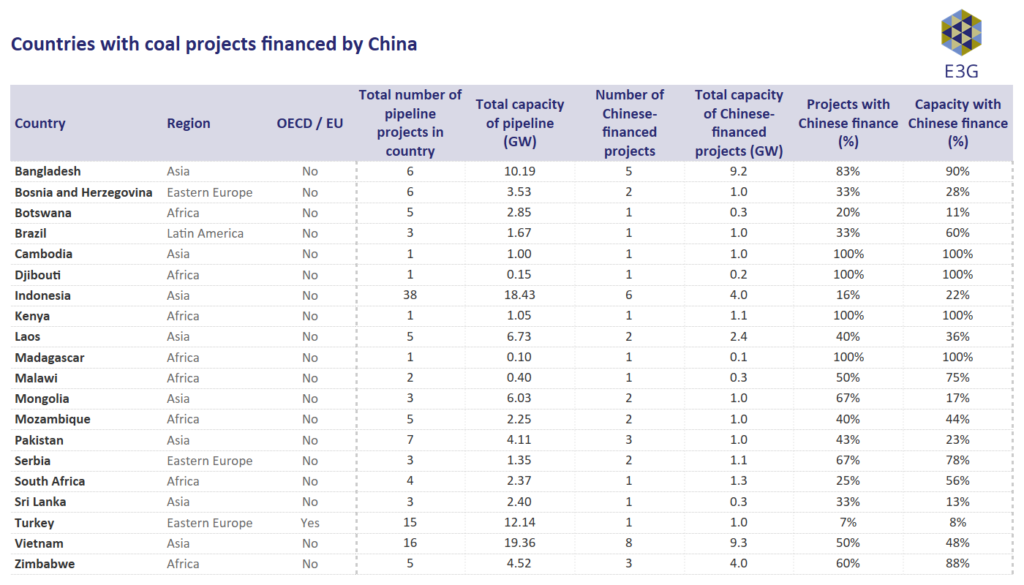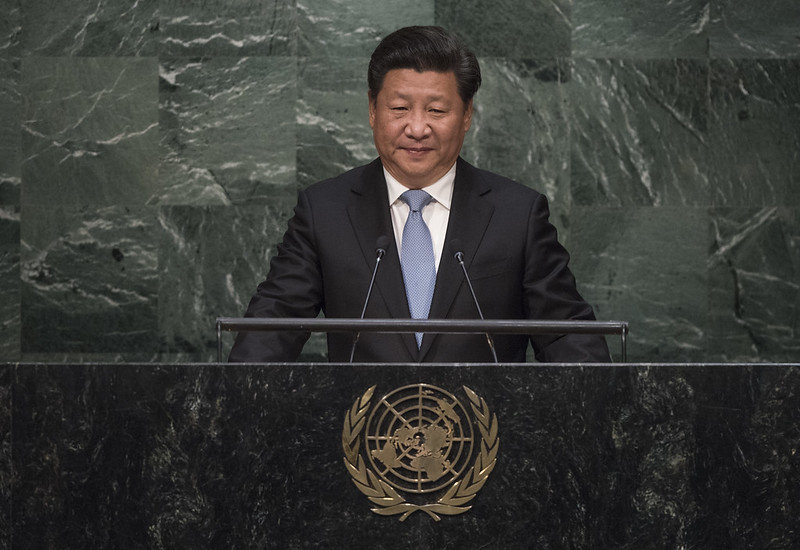China’s President Xi Jinping has announced that “China will step up support for other developing countries in developing green and low-carbon energy, and will not build new coal-fired power projects abroad”. This commitment can turbocharge the existing global transformation away from coal power, accelerating countries towards the finish line of ‘no new coal by 2021’.
E3G analysis shows that the global pipeline of pre-construction coal-fired power projects is down 76% since the Paris Agreement. 44 countries have already committed to ‘no new coal’. A further 40 countries are without a pre-construction pipeline and in a position to make a commitment of their own. This leaves 37 countries still with coal projects under development. Using data from Global Energy Monitor’s Global Coal Public Finance Tracker, we find that China is currently implicated in the financing of over 40GW of coal across 20 countries (Table 1), almost equivalent to the entire operating fleet of Germany.

No new coal by 2021 in Africa, Asia and elsewhere?
Eleven projects across eight countries potentially face cancellation as a result of China’s announcement – over half the remaining pipeline on the continent. Three countries (Djibouti, Kenya and Madagascar) have a single project in which Chinese public finance is involved, without which they would be in a position to commit to No New Coal. Shares in the developer of Mozambique’s Chinese-financed Ncondezi coal project dropped 20% the day after the announcement, as investors recognize the implications.
A response to the news from the Africa Coal Network (A group of 120+ African community organisations and NGOs) called for Xi to “end support from all Chinese institutions – private, state, parastatal, finance, insurance, importers, or proxies, that keep Africa’s coal mines, plants and other infrastructure under construction or planned”.
Asia sees a similar pattern, with Chinese finance involved in nearly 40% of the projects currently planned across the region. Bangladesh, home to the sixth biggest pipeline in the world, is reliant on Chinese finance for all but one plant. Given it has already scrapped 10 projects in 2021, Bangladesh could pivot entirely away from new coal by scrapping its remaining pipeline. Cambodia meanwhile only has one project under consideration. The withdrawal of Chinese investment could allow the country to move to a ‘no new coal’ future.
Most European countries had already fully moved away from new coal, with discussions now focusing on accelerating the retirement of their existing fleets, but an end to Chinese coal finance could tip the balance for the few countries still considering new coal. A third of Bosnia and Herzegovina’s, and two-thirds of Serbia’s planned coal projects are reliant on Chinese investment. This puts them in a position to terminate their new coal plans and explore retiring their existing fleets by 2040. Turkey is the only OECD country with planned coal projects funded by China, but has seen 69GW of planned projects cancelled since 2015. President Erdogan’s announcement yesterday that Paris ratification is now on the table must be followed by a ’no new coal’ commitment.
President Xi’s statement that China will not “build new coal-fired power projects abroad” also opens the door to China ending the significant role many state-owned Chinese companies play in the construction of such projects. China Power’s role as construction contractor in Kenya’s Lamu project could be under question, with the project already in doubt following ICBC’s decision in late 2020 to pull out of the project.
A key factor in the collapse of the coal pipeline and the rise of countries able to commit to ‘No New Coal’ has been the evaporation of public finance for new coal projects. This time last year China, Japan and South Korea were still financing new coal projects, yet following recent commitments from Tokyo and Seoul, Xi’s speech now sees a world in which international public finance for coal is all but dead. Public finance often provides the essential de-risking that then enables private investment to flow. Xi’s words send a clear signal to private financiers that their return on any further investment in coal is incredibly risky. With coal finance in retreat, countries can act confidently to commit to no new coal, prioritising green low-carbon energy instead.
China still hosts over half of the world’s operating coal fleet. To lend credibility to domestic climate targets, China should work with Italy at the G20 to get other major emitters to take a strong stance against coal, including setting out a clear timeline to phase out coal power at home. To keep 1.5C degrees within reach, China should aim to phase out unabated coal by 2040.

